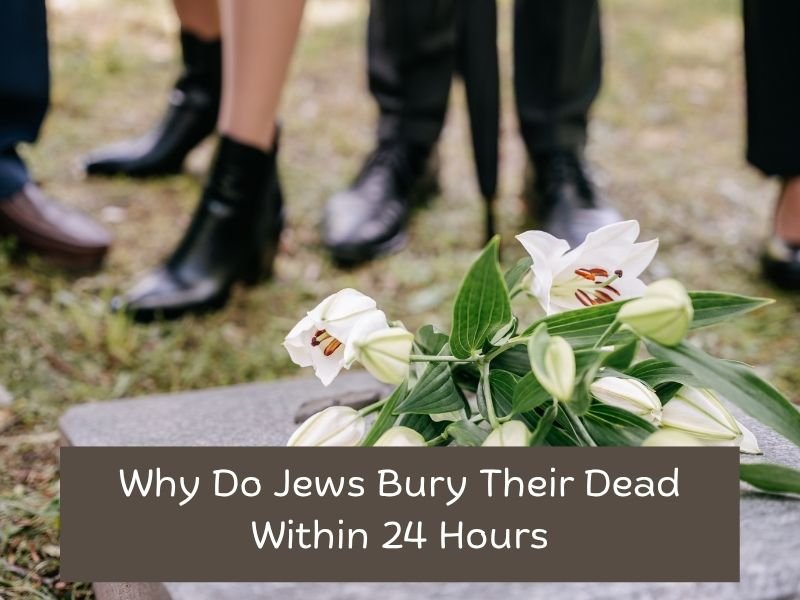In the Jewish faith, the rapid burial of a body within a day is a deeply historical customary practice which demonstrates both reverence toward the deceased and religious obligations. This is not simply a custom for the sake of custom, as it bears many layers of meaning, including legal, spiritual, and cultural traditions that have survived many years. This article focuses on the spiritual, religious, and historical causes of this custom, which has lasted for centuries.
Table of Contents
ToggleReligious Foundations
Biblical Origins
The biblical source of the commandment to bury a Jew within 24 hours comes from the scripture that demands timely burial. Deuteronomy 21:23 cites, “You shall bury him the same day.” This emphasised principle makes certain that a corpse does not go unburied, even for a single night, and as such must be interred without unreasonable delay.
Halachic (Jewish Law) Requirements
Halacha, as an extension of this biblical command, underscores the kindness one shows by burying the dead promptly. The Shulchan Aruch, one of the central writings of Jewish law, states that burial must occur as soon as possible, ideally the same day as death. This, too, is determined by the notion of kavod ha-met, the “honour of the dead,” which compels us to treat the dead with the greatest dignity imaginable. This notion is reinforced in the Talmud where it is stated that even a High Priest, who is typically forbidden from having contact with the deceased, is expected to bury an unattended corpse, abidance depicting the pivotal nature of this obligation.
Spiritual and Theological Relations
Faith in the Life of a Soul
As for Judaism, it is believed that the soul (neshama) is everlasting, and so its journey persists even after one’s physical demise. It is suggested by Kabbalistic teachings that until the body is properly buried, the soul faces difficulty and restlessness. The burial rite not only allows the soul to find solace but enables ascending toward higher planes of reality, facilitating uninterrupted, continued progress in its spiritual voyage.
This is indicative of the type of thought aiming to remedy or cleanse something lacking purity or a tainted form of completion rather than destruction, hence the Angeles of Shabbat, which includes the view on a point when the world can be reckoned as whole or fully complete.
Return is not just a physical act but also a spiritual way that enables the soul to ascend, enabling the soul to find its resting place in the world to come.
Ancient Practices and Community Norms
In early Jewish communities, death was not solely a religious matter; rather, it was a social responsibility that every community member had to fulfil. The body was prepared for burial through a process referred to as taharah that was done by the chevra kadisha (sacred burial society). This sacred act of kindness, chesed shel emet, was considered one of the greatest mitzvot, for it could never be repaid by the deceased.
The custom of quick burials gained prevalence in Jewish societies long before the advent of modern preservation technologies. Without refrigeration or embalming, health and dignity delays were issues that needed to be addressed. Therefore, a spiritual and practical imperative required that burials occur as soon as possible, within 24 hours.
Practical Considerations in Ancient Times
The hot climate of ancient Israel and the surrounding regions made it difficult to preserve bodies for long periods. Delayed burials could lead to rapid decomposition, which was not only a health hazard but also a disrespect to the deceased.
Furthermore, Jewish law does not permit embalming or open-casket funerals. These laws stem from the belief that a corpse must return to the earth without any changes and in a natural way. As noted by the Jewish Burial Society of America, this regard for the body accentuates the promptness of burial.
Modern Interpretations and Exceptions
When Burial Within 24 Hours is Not Possible
While Jewish law underscores the goal of a 24-hour burial, there are instances when it may not be possible. Circumstantial factors such as autopsy procedures (which are generally against Jewish law), and securing a death certificate, as well as logistical factors such as long-distance transportation of the corpse, can delay burial.
In these instances, rabbis may allow for a brief pause, given that the pause is intended to enhance the proper burial. Interment becomes enhanced when family members who are related to the deceased are given time to arrive before the funeral.
Variations Among Jewish Denominations
The differences among Jewish denominations may apply and observe this law with varying degrees of rigidity. Generally, Orthodox communities follow the 24-hour custom without deviation, except in cases of unavoidable delay. Conservative communities accept the custom but with more flexibility. Reform communities may emphasise the symbolic interpretation of the rule, focusing on the intent rather than literal observance.
The United Synagogue of Conservative Judaism observes that adherence to set instructions is encouraged, but often, Reform and Conservative rabbis partner with families to bridge the divide between timeless elements and contemporary life.
Contemporary Significance
Emotional and Psychological Elements
Early Jewish burial customs stem from human-centred rationale concerning the emotional aspects of family closeness. Before burial, mourning is discouraged in Jewish culture, and the full grieving process is only allowed to begin after the burial, which starts with shiva.
A rapid burial practice such as this enhances psychological well-being by offering closure. It allows survivors to move from shock and the many logistical details needing attention to the mourning rituals that offer the community support and spiritual healing that Heyns specialises in. This is especially important in Jewish philosophy on grief, which focuses on creating a safe and caring environment for survivors grappling with loss.
The National Jewish Health Resource Centre states that burial, if done promptly, can be beneficial to a person’s mental health because it puts an end to the death and mourning processes.
Continued Relevance of the Practice
The Jewish community still widely advocates for early burials, even with modern advances in body preservation techniques and flexible scheduling of funeral services. It illustrates the values of respectful humility, as well as the holiness surrounding life and death.
In addition, early Jewish burial customs correspond with eco-friendly initiatives, such as no embalming, the use of non-toxic materials, and natural decomposition. As such, this ancient practice is still observed throughout religious and non-religious settings.
One instance is found in Israel, where the Jewish tradition of immediate burial is not only a religious obligation, but also part of the national system for handling funerals. Funerals are conducted within a day of death; hence, the members of the community work collectively for the deceased. The Israeli Ministry of Religious Services ensures compliance with halachic stipulations.
Conclusion
As the Jews intricately weave life, death, and history within their culture, the practice of burying their kin within twenty-four hours of death crosses many ancient customary practices. It is structured in biblical dictates and touches upon respect for life, love among kin and compassion-driven community spirit. The centuries of rabbinical thought during practical and spiritual necessity serve as the epitome of compassion, kindness, community duty, and respect rolled into one.
Despite the softened approach to modern traditional adaptations, the foundational values around the practice observe strict orthodox commitment. With gentle grace, the act of honouring life in a dignified manner unravels from the heart of each Jewish individual, speaking boldly to the enduring lilifelongommitment to uphold love in a Jew’s journey from inception to the end.

